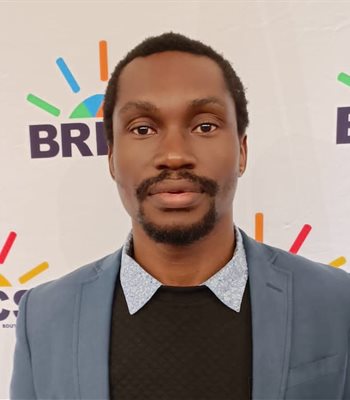
Dr Uduak Johnson, Mancosa academic
Whistleblowing has exposed many cases of corruption and unlawful behaviour including several recent cases involving South Africa's most prominent citizens. However, this has come with significant risks, as many whistleblowers face intimidation, bullying and sometimes even grievous bodily harm or death.
Despite this, the role of a whistleblower is essential for economic growth. Three Mancosa academics have been invited to present a research paper titled: Whistleblowing in South Africa: A vulnerable watchdog at the upcoming Brics Summit to be held in Pretoria, South Africa from 17 to 19 July.
Discussing a key issue
Following extensive research, Dr Uduak Johnson, Dr Premlall Ramlachan, and Andile Magqirana compiled an exciting paper, which will be presented at the University of Pretoria, where an important delegation from the Brics countries will be meeting between 17 and 19 July.
"The role of whistleblowers is important in any society. However, it is crucial in developing countries that are challenging the current global economic powers. We must highlight the important role that whistleblowers play in the growth of these economies," says Dr Johnson.
Reporting illegal activities: only for the brave few
The role of whistleblowing has increased in South Africa over the past ten years.
Whistleblowing saw the creation of the Zondo Commission of Inquiry, where civil societies demanded that significant action be taken against those involved in corruption and state capture. Another important whistleblowing case was the reporting on corruption at the Gauteng Department of Health. Finally, another prominent whistleblowing case was the tell-all interview from former Eskom chief executive Andre de Ruyter on ENCA, where he reported on alleged corruption at the power utility.
"President Cyril Ramaphosa has highlighted the brave role of whistleblowers in South Africa. However, these parties continuously face all kinds of discrimination. Our research paper highlights this issue from the perspective of whistleblowers who shared their experiences with the media. We examined these cases using a critical social justice approach and applied ethical theories to compile our research," says Dr Johnson.
There needs to be governance reform
One of the key issues that the paper discusses is the need for governance reform. "While many governments have acknowledged the important role of whistleblowers, very little has been done to create platforms where whistleblowers feel safe," says Dr Johnson.
Dr Johnson points out that in some countries, whistleblowers are rewarded for coming forward and exposing corruption and other illegal activities. Despite this, these parties still face significant reprisals and discrimination. Another important issue highlighted in the Mancosa Paper is that even though whistleblowing is prominent in most countries, governments and legal authorities are sometimes guilty of not following through with the investigations into cases of suspected corruption.
Highlighting benefits
While the Mancosa research paper highlights the plight of whistleblowers as social watchdogs, it also hopes to encourage the reform that will create meaningful change.
"In February this year, the Financial Action Task Force greylisted South Africa citing a lack of systems and processes which assesses and manages the risk of corruption and money laundering. If encouraged, whistleblowing would have created a platform to address rising corruption risks. If used effectively, it could be a significant weapon in our efforts to recover our economic position," says Johnson.
Additionally, whistleblowing is the biggest weapon civil organisations can use to keep governments in check and encourage meaningful societal change.
An important platform
Johnson points out that presenting this paper at the Brics Summit is a major platform for highlighting this issue.
"The Brics cluster is currently showing significant value in challenging the traditional dominance enjoyed by Western economies. Many other countries have noticed the Brics cluster's value and applied for membership. Brics is posing a serious challenge to the hegemony of the US dollar as the exclusive global currency for international economic transactions,” says Johnson.
He adds that South Africa could play a central role in this recovery. “However, this will only be possible if we have an economy that is driven by a financially strong private and public sector. This can only be achieved if whistleblowing is encouraged rather than left vulnerable."
He adds that a few developments have occurred since the publication of this paper. Government has issued a discussion paper for public opinion on issues related to adjusting the policies related to whistleblowing and the protection of whistleblowers. This is good news for the future of whistleblowers in South Africa.
